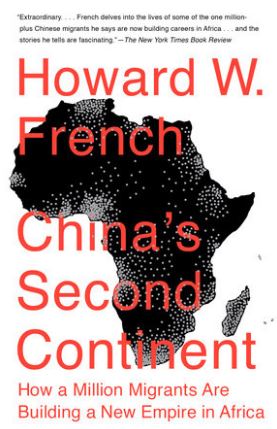
(Continue Part I)
In French’s nearly all of the 270-page manuscript of China’s Second Continent, I relate to every personal account. French’s interviewees in nonfiction are like characters in fiction. I prefer calling them characters anyway. So every character comes alive when they speak. One thing I notice is unlike the coolies and poor-stricken laborers in the 20th century who traveled across the sea from China to Southeast Asia and North America, the Chinese migrants to Africa in the turn of the 21st century worked either with a state-owned enterprise or as the first batch of college grads with a foreign language major. In other words, the Chinese in Africa were not illiterate. They received some education at home. They might not speak a foreign language but they were party loyalists for sure.
I was still young when China sent tens of millions of laborers abroad in the 1990s. Many of them went to the developing countries in Central Asia, Africa, South America, you name it; or to the developed countries in the EU and North America where there was a shortage of professionals in such fields as nursing and a shortage of others to do dirty, manual labor jobs. And most important, where there were Chinese state-funded projects abroad, there were Chinese workers.
As French wrote, “Chinese had been coming here [Zambia] in substantial numbers since the 1990s, earlier than to almost any other country on the continent. By now [as of the writing of the book] they numbered 100,000 or so by some estimates, making them one of China’s biggest migrant communities in Africa.”
Economic migration is a norm in the 21st century. During the same time, tens of thousands of African traders resided in China. Guangzhou was one of the biggest African hubs in the country. Before my literary exposure to Africa, my understanding of Africa was through these foreigners in my hometown.
In his book, French tries to strike a balance between the way the Chinese opportunists see Africa and how Africans see the Chinese in Africa. The negativity about the Chinese influence in Africa is prevalent throughout the book. I find it ironic that the Africans in the book blame the Chinese for local problems, likewise, the Chinese back at home in Guangzhou, in particular, also blame the African traders for the city’s social problems.
But nobody—neither the Africans nor the Chinese—says no to an inexpensive business deal offered by the Chinese to the Africans. Nobody, not even the US or the EU, intervenes or reminds the Africans of the irrevocable trade-off in these deals on their natural resources and people’s wellbeing.
China is known for tofu-dreg projects—structures that are as flimsy and porous as tofu dregs—at home and now abroad in Africa. The author has mentioned a few poorly-constructed, made-by-Chinese projects in his book. When Wenchuan Earthquake happened in 2008, the Sichuan provincial authorities tried all they could to cover up the tofu-dreg projects that led to thousands of schoolchildren buried under the debris of the poorly-constructed classrooms.
Africa needs a second or a third contractor other than China to compete for projects. Africa needs continental financial benchmarks and regulations on foreign investments and the use of resources. Africa needs more intergovernmental treaties to protect the African consumer and labor rights and safety. Africa needs more local born-and-raised entrepreneurs and business dealers. I’m glad to learn that Rwanda has launched the first “Made in Africa” smartphones to compete against China’s phone monopoly in the market.
China builds infrastructure in Africa while the US provides medical and education to the African people. I find that these two actors are like the US politics where the Republicans focus on hard power like defense and send more troops abroad, and the Democrats focus on soft power like diplomacy and increase spending on the African poor.
Never fall into the Chinese’s win-win rhetoric. On the one hand, hiring Chinese to work abroad looks like spending abroad, but the workers’ wages are actually part of China’s GDP (This tactic reminds me of the incumbent US President’s shifting official to his hotels and resorts). On the other hand, when the bridges, roads and other infrastructure projects begin making profits, African governments have to pay back China’s loan. It’s still advantageous to China’s balance sheet, not to the debtors.
The Chinese don’t, or in their words, slowly, teach African people skills. The Chinese’s bias about Africans’ intelligence echoes racial bias in the US. When can humanity put down our sunglasses to see one another’s true colors?
To do it right, we need to empower African people with knowledge and education. As a proverb goes, give a man a fish and you feed him for a day; teach a man to fish and you feed him for a lifetime. We need more African leaders like Nelson Mandela, Kofi Annan, Abiy Ahmed, Wangari Maathai, Miriam Makeba, Ellen Johnson Sirleaf and many more.
I can’t agree more with Ghanaian Albert Osei, one of French’s interviewees. He said, “China’s involvement should help us change the terms of engagement with the West, in order to gain greater equity, more parity. If the West is jealous of China, we should say to them, Train our people and give them a bigger role in your companies. Don’t complain about the Chinese. Help us move up the value chain. Do this, and we will love you.”
No matter if it is an emerging economy like China or the rich world, we are writing our history by our deeds. Historically, we are all in debt to the African people because for many generations we have achieved our prosperity at the cost of their well-being.
